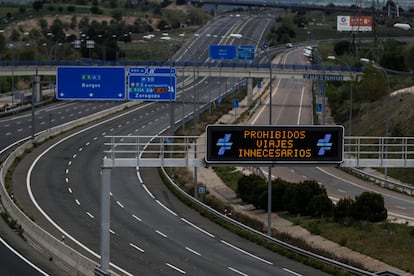Despite fears in tourist towns, no evidence of mass arrivals of visitors to second homes in Spain
More than 10,000 checkpoints were put in place ahead of the Easter break to ensure the lockdown measures were respected, with concrete blocks installed at the entrance to some municipalities

In Marbella, Tarifa, Chiclana, Valencia, Llanes, Galicia, the Costa Brava… The tourists never arrived. More than 10,000 checkpoints put in place by the Civil Guard on Spanish roads, as well as those operated by local police forces – not to mention blocks of concrete installed at the entrances of Spanish municipalities with high numbers of vacation homes – were either unnecessary or dissuaded anyone who was tempted to break lockdown measures and get to their second residence for the Easter weekend.
Traffic jams seen on the exit roads out of big cities such as Madrid earlier this week were due to these checkpoints, according to the general secretary for transport, María José Rallo. A total of 3,090 drivers were fined on Thursday for breaking the confinement measures, a figure that tallies with the average daily number of such sanctions imposed since the state of alarm was introduced on March 14 by the Spanish government in a bid to slow the spread of the coronavirus.
The Asturias regional premier called on residents to contact the authorities if they saw the arrival of visitors
Even so, many local mayors in places that attract high numbers of tourists have remained on the alert these last few days given the possibility that visitors would arrive from other regions to enjoy the Easter break.
The regional premier of Asturias, Adrián Barbón of the Socialist Party (PSOE), called on residents of tourist towns and villages to contact the authorities if they spotted the arrival of people from outside Asturias, explaining that “there were many messages arriving from residents denouncing the arrival of people from outside.” But the mayor of Llanes, the part of Asturias that attracts most tourists, explained that the data facilitated by the Civil Guard and local police contradicted these reports. “It’s possible that if someone sees someone they don’t know, they are talking about it on social media and after that the news spreads like wildfire,” he said.
“From the Civil Guard we want to inform you that we categorically refute the information that is appearing on certain social media profiles denouncing the mass arrival of visitors and tourists to areas such as Zahara de los Atunes, El Palmar, or La Barrosa,” said a spokesperson from the Civil Guard in Cádiz. “People want to believe something that is not real,” added the mayor of Tarifa, Francisco Ruiz. “We have been putting tactical checkpoints in place and I am told there is nothing out of the ordinary,” he added. “There is no movement.” The local council in Chiclana de la Frontera also denied there had been arrivals of visitors.
Marbella, Mijas and Fuengirola also saw little movement these last days, while the Valencia regional government said the same, reporting an 80% drop in traffic compared to last year. In Galicia, checkpoints were put in place on the AP-9 freeway, but no one was intercepted.
The most touristy areas of the Costa Dorada and the Costa Brava in Catalonia were given extra protection against unwanted visitors. The majority of towns and villages – including Salou, Cambrils, Calafell, Port de la Selva, Begur and Palafrugell – installed concrete blocks in their entry roads to stop vehicles from accessing them, and employed drones to detect anyone who tried to breach the lockdown. Some local mayors also called on residents to report the presence of people coming to their second homes, but there was no record of significant incidents.
Fines in Catalonia
A total of 88 people, however, were fined at the start of the Easter weekend trying to reach their second residences by the Catalan regional police, the Mossos d’Esquadra. One family was stopped on their way out of Barcelona with their car filled with groceries, and they confessed they were trying to get to their second home in Salou. They were fined for breaching the lockdown and forced to return to their homes.
With reporting from Patricia Ortega Dolz, Jesús A. Cañas, Ferrán Bono, Sonia Vizoso, Nacho Sánchez, Marc Rovira, Jesús García and Marta Rodríguez.
English version by Simon Hunter.
Tu suscripción se está usando en otro dispositivo
¿Quieres añadir otro usuario a tu suscripción?
Si continúas leyendo en este dispositivo, no se podrá leer en el otro.
FlechaTu suscripción se está usando en otro dispositivo y solo puedes acceder a EL PAÍS desde un dispositivo a la vez.
Si quieres compartir tu cuenta, cambia tu suscripción a la modalidad Premium, así podrás añadir otro usuario. Cada uno accederá con su propia cuenta de email, lo que os permitirá personalizar vuestra experiencia en EL PAÍS.
¿Tienes una suscripción de empresa? Accede aquí para contratar más cuentas.
En el caso de no saber quién está usando tu cuenta, te recomendamos cambiar tu contraseña aquí.
Si decides continuar compartiendo tu cuenta, este mensaje se mostrará en tu dispositivo y en el de la otra persona que está usando tu cuenta de forma indefinida, afectando a tu experiencia de lectura. Puedes consultar aquí los términos y condiciones de la suscripción digital.








































